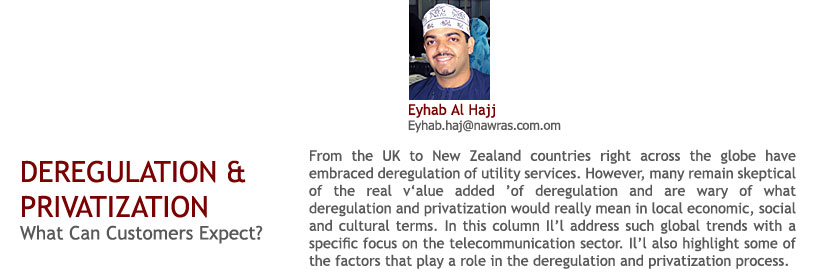
There’s a general consensus that public utility services such as electricity, water and telecommunications are integral parts of the infrastructure of a modern society. These services are typically provided by complex capital intensive systems that serve as a network through which centralized supply sources are linked to a range of customer classes. Such services are viewed by many as critical in enhancing productivity, generating wealth and creating employment.
Despite the many themes under which privatization is carried out, the main concept lies with ‘ownership’. Broadly speaking, it involves the transfer of ownership and/or control of a state-owned organization to private investors. There are five major pressure factors actively promoting deregulation:
- The quest to increase innovation and efficiency within the deregulated sector;
- Drive prices lower and increase value to customers;
- Create choice – this is probably the most meaningful factor to consumers who have been locked into using services provided by a monopoly. Theoretically, the mere fact that deregulation takes place indicates a less controlled and more competitive environment, one that creates a dynamic sector offering choice, one that elevates the buyer from being a client to a full-bloodied customer.
- Limiting the market power of a monopolistic incumbent; and
- Creating a superior infrastructure capable of serving all sectors of society.
Many of the above benefits have been realized and can be categorized as follows:
- Ideological Shift - With deregulation comes a growing shift in mindset towards free market economics. However, we should be careful not to use this statement out of context, since most developing markets can’t afford an immediate shift, but would rather take it in incremental steps - allowing the local market to adopt and develop to international standards.
- Regional Bandwagons – States that don’t embark on privatization programmes, risk becoming technologically obsolete. This is specifically true in the growing telecommunications industry where the quickest way of importing international expertise and the latest technological advances is through privatization - this helps create more choice and meets changing customer needs. Indeed, one of the major features of both deregulation and privatization is increased ‘responsiveness’, particularly important in a fast evolving industry.
- Fiscal Imperatives - High subsidies to some inefficient state owned organizations become a burden on scarce resources and increase the risk of economic stagnation.
- Globalization of Commerce – Global competition would further help expose organizational inefficiencies and increase the pressure on seeking and identifying business improvement opportunities. Most of these improvements currently take the form of strategic alliances by which the different parties capitalize on their strengths and overcome weaknesses in the fastest and most effective manner.
- Globalization of Finance – The availability of global funds and identifying FDI (Foreign Direct Investment) to further boost the local economy is increasing demand, and deregulation is considered a prerequisite for encouraging investors to increase the inflow of funds and stimulate the market.
- Institutional Capacity – The appointment of a state board to assist privatization and international agencies, further encourages private investors to invest in developing markets. The role of the regulatory authorities shouldn’t be underestimated. Besides the role of setting up the deregulatory framework that best fits the economic and social structure of the state, the regulator helps facilitate the competitive environment, a role that’s regarded as a key factor in ensuring that the privatization process is sustainable.
- Growing Middle Class – Privatization opens up employment opportunities - for each new market entrant there are typically multiple contracts (in most cases - preference is given to local companies), this not only generates an increased demand on the local workforce but also drives development in on-the-job training and skill development. In turn, the growing middle class increases its demand for premium goods and services - particularly for communication and transportation services – and this encourages growth in the private sector to meet such demands. This cycle generates internal economic growth that’s sustained by the skills and capabilities of the state’s own people.
- Technological Advancement – The private sector has the knowledge to design and manage the infrastructure efficiently, as well as the capacity to operate beyond the boundaries of existing networks, this is particularly observed in the telecommunication industry. (Adopted from Price Waterhouse, 1996)
The number of people using mobile services in Oman has increased n-fold since the market was deregulated, this has resulted in greater public awareness and knowledge vis-a-vis teleco products and services. Savvy consumers the world over drive competition. Indeed, as the public keeps a keen eye on competitive telco trends, increased consumer benefits should support the argument for further and deeper deregulation in other sectors.








